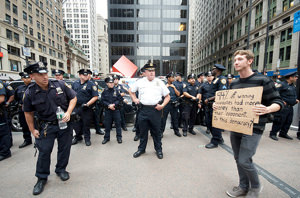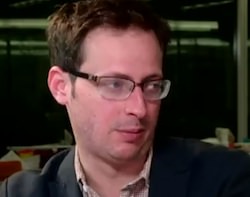Journalistic Objectivity Sours Wall Street Reporting
In an attempt "not to judge either side" involved in the anti-corporate demonstrations that have gone on near Wall Street since Sept. 17, New York Times reporter Brian Stelter used the word "battle" in a tweet to describe Saturday's altercation between police and protesters, in which officers pepper-sprayed apparently peaceful demonstrators. (more)
In an attempt “not to judge either side” involved in the anti-corporate demonstrations that have gone on near Wall Street since Sept. 17, New York Times reporter Brian Stelter used the word “battle” in a tweet to describe Saturday’s altercation between police and protesters, in which officers pepper-sprayed apparently peaceful demonstrators.
New Jersey journalist Michael Tracey took issue with Stelter’s choice of words. Despite video evidence that Tracey says shows police used undue aggression against protesters, Stelter characterized the two parties as battlers, a word Tracey points out suggests both were equal aggressors in the conflict. Both Stelter’s description of the events and his justification of the wording are emblematic of “a sacred standard of impartiality” that many reporters state is their prime journalistic duty, a standard that Tracey argues is often used to obscure rather than accurately report events. –ARK
Your support matters…Michael Tracey:
So I had a question for Stelter — what evidence indicated to him that a “battle” had taken place yesterday, or in other words, what evidence indicated that protestors had “battled” police? Again, the term “battle” implies the participation at least two parties, but there is no reason (as yet) to believe that protestors attacked police. Here’s what Stelter said in response: “I used the word “battle” in an attempt not to judge either side.”
Let’s think about this. “In an attempt not to judge either side,” Stelter characterized both sides as “battlers.” How is that not a judgement in [and] of itself? There is clear evidence that police attacked protestors, but no evidence that protestors attacked police, yet Stelter casts both in exactly the same light because he presumably feels that upholding a sacred standard of impartiality is his prime journalistic duty. Even with video evidence available, Stelter shies away from accurately conveying what transpired, because it’s of paramount importance to remain “impartial,” no matter what, always.
This is a perfect manifestation of the pathology of objectivity. Stelter evidently was not interested in accurately portraying the facts. Rather, he obscured them.
Independent journalism is under threat and overshadowed by heavily funded mainstream media.
You can help level the playing field. Become a member.
Your tax-deductible contribution keeps us digging beneath the headlines to give you thought-provoking, investigative reporting and analysis that unearths what's really happening- without compromise.
Give today to support our courageous, independent journalists.



You need to be a supporter to comment.
There are currently no responses to this article.
Be the first to respond.